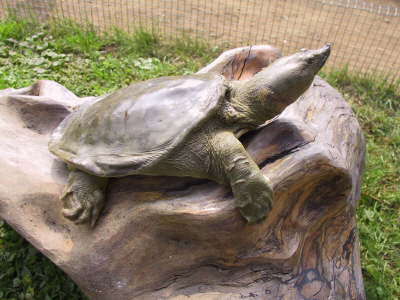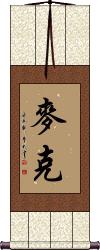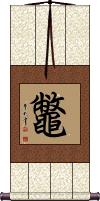Many custom options...
And formats...

Unfortunately in Chinese / Japanese...
Buy an Unfortunately calligraphy wall scroll here!
Personalize your custom “Unfortunately” project by clicking the button next to your favorite “Unfortunately” title below...
MacK
Japanese Snapping Turtle / Chinese Soft Shell Turtle
鼈 refers to a species of turtle.

鼈 is Trionyx Sinensis.
鼈 refers to different turtles in different languages. See individual language notes below:
Japanese: 鼈 means “snapping turtle” or “mud turtle.” But rarely used as a single Kanji like this in Japanese.
Chinese: 鼈 means soft-shelled turtle. A specific species, Trionyx Sinensis is native to Asia.
In China, this species is related to the “wang ba,” a soft-shelled turtle sometimes known in English as a banjo turtle (due to its long neck, and general shape). Unfortunately, there is a word, “wang ba dan” which means the egg of this species of turtle. That term has come to mean “bastard” in Chinese (a turtle hatches from an abandoned egg, and does not know who his mother or father is). 鼈 is not a good selection for a wall scroll if your audience is Chinese.
In Korean, this character can be pronounced (though most Koreans would have to look it up in a dictionary). It has not been in common use in Korea for at least a few hundred years.
General notes: You may notice that the bottom half of this character is the same as some other turtle-related titles. That bottom half is actually an ancient character that means “toad.” ![]() Though not seen in this way today, most turtle-related characters hold the meaning of “a toad with a shell” in their ancient origin. That toad character is rarely used alone anymore but you can see what it looks like in the image to the right.
Though not seen in this way today, most turtle-related characters hold the meaning of “a toad with a shell” in their ancient origin. That toad character is rarely used alone anymore but you can see what it looks like in the image to the right.
Broken Mirror Rejoined
Used in modern times for divorced couples that come back together
破鏡重圓 is about a husband and wife who were separated and reunited.
About 1500 years ago in China, there lived a beautiful princess named Le Chang. She and her husband Xu De Yan loved each other very much. But when the army of the Sui Dynasty was about to attack their kingdom, disposed of all of their worldly possessions and prepared to flee into exile.
They knew that in the chaos, they might lose track of each other, so the one possession they kept was a bronze mirror which is a symbol of unity for a husband and wife. They broke the mirror into two pieces, and each of them kept half of the mirror. They decided that if separated, they would try to meet at the fair during the 15th day of the first lunar month (which is the lantern festival). Unfortunately, the occupation was brutal, and the princess was forced to become the mistress of the new commissioner of the territory, Yang Su.
At the Lantern Festival the next year, the husband came to the fair to search for his wife. He carried with him his half of the mirror. As he walked through the fair, he saw the other half of the mirror for sale at a junk market by a servant of the commissioner. The husband recognized his wife's half of the mirror immediately, and tears rolled down his face as he was told by the servant about the bitter and loveless life that the princess had endured.
As his tears dripped onto the mirror, the husband scratched a poem into his wife's half of the mirror:
You left me with the severed mirror,
The mirror has returned, but absent are you,
As I gaze in the mirror, I seek your face,
I see the moon, but as for you, I see not a trace.
The servant brought the inscribed half of the mirror back to the princess. For many days, the princess could not stop crying when she found that her husband was alive and still loved her.
Commissioner Yang Su, becoming aware of this saga, realized that he could never obtain the princess's love. He sent for the husband and allowed them to reunite.
This proverb, 破鏡重圓, is now used to describe a couple who has been torn apart for some reason (usually divorce) but have come back together (or remarried).
It seems to be more common these days in America for divorced couples to reconcile and get married to each other again. This will be a great gift if you know someone who is about to remarry their ex.
Not the results for unfortunately that you were looking for?
Below are some entries from our dictionary that may match your unfortunately search...
| Characters If shown, 2nd row is Simp. Chinese |
Pronunciation Romanization |
Simple Dictionary Definition |
不巧 see styles |
bù qiǎo bu4 qiao3 pu ch`iao pu chiao |
too bad; unfortunately; as luck would have it |
不幸 see styles |
bù xìng bu4 xing4 pu hsing fukou / fuko ふこう |
misfortune; adversity; unfortunate; sad; unfortunately; CL:個|个[ge4] (noun or adjectival noun) (1) unhappiness; sorrow; misfortune; disaster; accident; (2) death (usu. of a relative); bereavement |
偏偏 see styles |
piān piān pian1 pian1 p`ien p`ien pien pien |
(indicating that something turns out just the opposite of what one would wish) unfortunately; as it happened; (indicating that something is the opposite of what would be normal or reasonable) stubbornly; contrarily; against reason; (indicating that sb or a group is singled out) precisely; only; of all people |
可惜 see styles |
kě xī ke3 xi1 k`o hsi ko hsi kashaku あったら |
it is a pity; what a pity; unfortunately (adverb) (kana only) alas; regrettably; to my great regret; tragically unfortunately |
吃虧 吃亏 see styles |
chī kuī chi1 kui1 ch`ih k`uei chih kuei |
to suffer losses; to come to grief; to lose out; to get the worst of it; to be at a disadvantage; unfortunately |
合憎 see styles |
ainiku あいにく |
(irregular kanji usage) (adj-na,adv,n,adj-no) (kana only) unfortunately; Sorry, but ... |
無奈 无奈 see styles |
wú nài wu2 nai4 wu nai muna |
to have no alternative; frustrated; exasperated; helpless; (conjunction) but unfortunately what can be done...? |
生憎 see styles |
ainiku あいにく |
(adj-na,adv,n,adj-no) (kana only) unfortunately; Sorry, but ... |
それが see styles |
sorega それが |
(expression) (1) (subject of sentence) that; it; (expression) (2) (used to respond hesitantly to a question) well, actually ...; well, unfortunately ... |
憚り様 see styles |
habakarisama; habakarisan はばかりさま; はばかりさん |
(int,n) (form) thank you for your trouble; unfortunately ... |
不幸にも see styles |
fukounimo / fukonimo ふこうにも |
(exp,adv) unfortunately; unluckily; regrettably |
如何せん see styles |
ikansen いかんせん |
(adverb) (1) (kana only) to one's regret; regrettably; unfortunately; (expression) (2) (kana only) (form) (as 〜をいかんせん) what can be done about ...; ... cannot be helped |
折り悪く see styles |
oriwaruku おりわるく |
(adverb) unfortunately |
折悪しく see styles |
oriashiku おりあしく |
(adverb) unfortunately; at a bad time; at an unfortunate moment |
無福消受 无福消受 see styles |
wú fú xiāo shòu wu2 fu2 xiao1 shou4 wu fu hsiao shou |
unfortunately cannot enjoy (idiom) |
不幸にして see styles |
fukounishite / fukonishite ふこうにして |
(exp,adv) unfortunately; regrettably; sad to say |
困った事に see styles |
komattakotoni こまったことに |
(expression) the trouble is that ...; the problem is that ...; unfortunately; annoyingly |
折り悪しく see styles |
oriashiku おりあしく |
(adverb) unfortunately; at a bad time; at an unfortunate moment |
残念ながら see styles |
zannennagara ざんねんながら |
(exp,adv) unfortunately; regrettably |
残念な事に see styles |
zannennakotoni ざんねんなことに |
(expression) unfortunately |
遺憾ながら see styles |
ikannagara いかんながら |
(expression) I regret to say; I'm sorry to say; unfortunately |
何が悲しくて see styles |
nanigakanashikute なにがかなしくて |
(expression) (1) (emphatic, lamenting, sarcastic, often with なければならない, etc.) why; how come; (expression) (2) unfortunately; alas |
困ったことに see styles |
komattakotoni こまったことに |
(expression) the trouble is that ...; the problem is that ...; unfortunately; annoyingly |
残念なことに see styles |
zannennakotoni ざんねんなことに |
(expression) unfortunately |
Variations: |
oriashiku おりあしく |
(adverb) (ant: 折好く) unfortunately; at a bad time; at an unfortunate moment |
Variations: |
komattakotoni こまったことに |
(expression) (See 困った事) the trouble is that ...; the problem is that ...; unfortunately; annoyingly |
Variations: |
zannennakotoni ざんねんなことに |
(expression) (See 残念) unfortunately |
Variations: |
ainiku あいにく |
(adj-na,adv,n,adj-no) (kana only) unfortunately; sorry, but ... |
Variations: |
oriashiku おりあしく |
(adverb) (ant: 折好く) unfortunately; at a bad time; at an unfortunate moment |
Variations: |
ainiku あいにく |
(adj-na,adv,n,adj-no) (kana only) unfortunately; sorry, but ... |
Click here for more unfortunately results from our dictionary
The following table may be helpful for those studying Chinese or Japanese...
| Title | Characters | Romaji (Romanized Japanese) | Various forms of Romanized Chinese | |
| Mac | 麥克 麦克 | mài kè / mai4 ke4 / mai ke / maike | mai k`o / maiko / mai ko | |
| MacK | 麥克 麦克 | mài kè / mai4 ke4 / mai ke / maike | mai k`o / maiko / mai ko | |
| Japanese Snapping Turtle Chinese Soft Shell Turtle | 鼈 | suppon / supon | biē / bie1 / bie | pieh |
| Broken Mirror Rejoined | 破鏡重圓 破镜重圆 | pò jìng chóng yuán po4 jing4 chong2 yuan2 po jing chong yuan pojingchongyuan | p`o ching ch`ung yüan pochingchungyüan po ching chung yüan |
|
| In some entries above you will see that characters have different versions above and below a line. In these cases, the characters above the line are Traditional Chinese, while the ones below are Simplified Chinese. | ||||
Successful Chinese Character and Japanese Kanji calligraphy searches within the last few hours...






